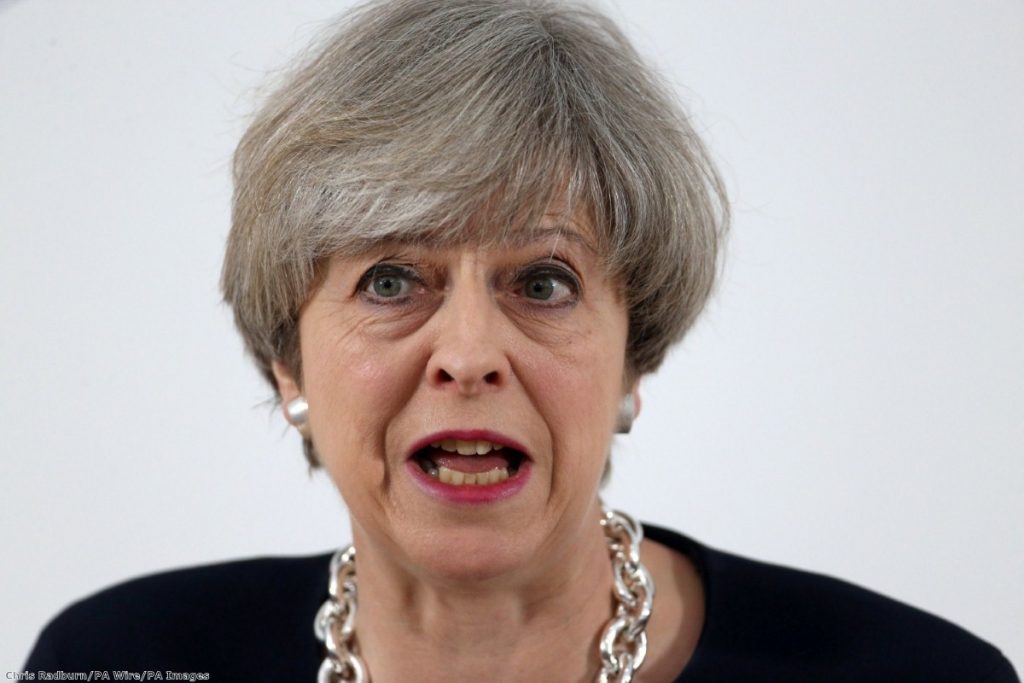It is hard to fully comprehend the scale of the stupidity which has seized Downing Street. After a few days of bad headlines and a handful of resignations by people no-one had ever heard of, Theresa May is dismantling the white paper she published last week and accepting terms which would all-but guarantee no-deal Brexit. It is cowardice on a Olympic scale.
No.10 confirmed yesterday that it would be backing all the amendments put down by hard Brexiters to the customs bill, saying they were compatible with the Chequers agreement it was defending last week.
"I would not have gone through all the work I did to ensure we reached that agreement only to see it changed in some way through these bills," Theresa May told the Commons today. "They do not change that Chequers agreement."
She is wrong. One amendment prohibits the "collection of certain taxes or duties on behalf of territory without reciprocity". The white paper, on the other hand, states that Britain will collect tariffs on behalf of the EU at its own borders, but "is not proposing that the EU applies the UK’s tariffs and trade policy at its border".


These things simply cannot be put together. One prohibits non-reciprocal arrangements and the other describes them. The government is literally going to pass a law against its own Brexit plan and then, for good measure, insist the former does not "change" the latter. Indeed, you'll notice that, once again, 'nothing has changed'. Up is down and black is white. Nothing means anything.
But the reciprocity issue is not even the most lunatic of the propositions on offer. Far more dangerous is the proposal on the Irish backstop proposal. This makes it unlawful for the government "to enter into arrangements under which Northern Ireland forms part of a separate customs territory to Great Britain".
This amendment effectively makes it impossible for the government to secure a Brexit deal.
The Brexit deal, when it comes back, will actually be two documents: a withdrawal agreement and a set of commitments on the 'future relationship'. The first is a legal text. It'll be agreed by negotiating teams, taken back to the UK and European parliaments as a motion, then signed as a treaty, translated into primary legislation, and finally passed as law in the UK. This covers the divorce payment, citizens rights, transition and, crucially, the Irish problem.
The Irish backstop, which the UK signed off on last December, says that if all else fails and no other arrangements are made, a hard border in Ireland will be avoided by ensuring Northern Ireland and the Republic of Ireland have the same customs arrangements and regulatory structure. This would entail Northern Ireland having a seperate customs territory to Great Britain – the exact scenario the amendment rules out.
The 'future relationship' document, on the other hand, is political. It doesn't have any legal standing. It will say, in pretty vague terms, what the UK and EU want to achieve in their future relationship. This'll then be turned into concrete action after Brexit day, when the negotiations begin on what the trading arrangements would look like.
Some believe that the real function of the Chequers statement was to use this sequencing structure to force through a deal. May knew that the EU would never agree a customs partnership or single market in goods, which was the basis of her Chequers statement. But they didn't need to. They just needed to not reject it before Brexit Day.
That allowed her to pretend to hard Brexiters and the DUP that she had established a future relationship which would avoid the need for checks at the border. The backstop would never be needed. Now she could sign the deal, secure Brexit, and punt off all the problems into the 'future relationship' talks after it had taken place.
The amendment throws all of that into disarray.
Many Westminster insiders have treated it as irrelevant, because May already pledged not to form a customs border between Great Britain and Notthern Ireland. But there is a difference between promises and legislation. Putting that on the statute books would make it impossible for May to agree to the backstop while reassuring everyone that it would be irrelevant because of the future relationship.
It would strip everything down to law instead of politics: It is illegal to pursue an agreement putting a customs border in the Irish sea and this international treaty puts a customs border in the Irish Sea.
The government would be passing a law against its own negotiating strategy. That is surely not a tenable state of affairs. No sane political culture could throw up such an outcome.
It is incredible to think we have a government so gutless it would even consider this – especially when the ERG doesn't even have the numbers to defeat them. And it is also extraordinary that Brexit hardliners should pursue it. They are effectively starting a guerilla war against even the possibility of a deal.
Ian Dunt is editor of Politics.co.uk and the author of Brexit: What The Hell Happens Now?
The opinions in politics.co.uk's Comment and Analysis section are those of the author and are no reflection of the views of the website or its owners.










